- Home
- Richard Flanagan
And What Do You Do Mr. Gable?
And What Do You Do Mr. Gable? Read online
Also by Richard Flanagan
Death of a River Guide
The Sound of One Hand Clapping
Gould’s Book of Fish
The Unknown Terrorist
Wanting
All rights reserved. No part of this book may be reproduced or transmitted by any person or entity, including internet search engines or retailers, in any form or by any means, electronic or mechanical, including printing, photocopying (except under the statutory exceptions provisions of the Australian Copyright Act 1968), recording, scanning or by any information storage and retrieval system without the prior written permission of Random House Australia. Any unauthorised distribution or use of this text may be a direct infringement of the author’s and publisher’s rights and those responsible may be liable in law accordingly.
And What do you do, Mr Gable?
ePub ISBN 9781742752730
A Vintage book
Published by Random House Australia Pty Ltd
Level 3, 100 Pacific Highway, North Sydney NSW 2060
www.randomhouse.com.au
First published by Vintage in 2011
Copyright © Richard Flanagan, 2011
The moral right of the author has been asserted.
All rights reserved. No part of this book may be reproduced or transmitted by any person or entity, including internet search engines or retailers, in any form or by any means, electronic or mechanical, including photocopying (except under the statutory exceptions provisions of the Australian Copyright Act 1968), recording, scanning or by any information storage and retrieval system without the prior written permission of Random House Australia.
Addresses for companies within the Random House Group can be found at www.randomhouse.com.au/offices
National Library of Australia
Cataloguing-in-Publication Entry
Flanagan, Richard, 1961– And What Do You Do, Mr Gable?/Richard Flanagan.
ISBN 978 1 74275 272 3 (pbk.)
A823.3
Cover design by Design by Committee
Internal design by Midland Typesetters
Typeset and eBook production by Midland Typesetters, Australia
For Jim Bucirde
Out of a Wild Sea
Port Arthur
Went for a Swim
Self-massaging Ugg Boots
It’s Peter Dom
The Unbearable Lightness of Borges
Caramba
Nelson Algren’s War with America
Soviet Man
And What Do You Do, Mr Gable?
Bread
The History of Love
Louder Than the Storm
Family Is Everything
Our Keith
Metamorphoses
Sheep Management
Poor Fellow, My Suburb
The Rohypnol Rape Decade
Van Diemen’s Land
Lest We Forget
The Lost Larrikin
Gunns: the Tragedy of Tasmania
The Road to Kinglake
The Flanatta
Remember, too, that in literature you always lose, but the difference, the enormous difference, lies in losing while standing tall, with eyes open, not kneeling in a corner praying to Jude the Apostle with chattering teeth.
Roberto Bolaño
I like books that smell of sweat.
Gustave Flaubert
Richard Flanagan’s novels Death of a River Guide, The Sound of One Hand Clapping, Gould’s Book of Fish, The Unknown Terrorist and Wanting are published in twenty-six countries. He directed the feature film version of The Sound of One Hand Clapping. A rapid on the Franklin River, Flanagan’s Surprise, is named after him.
I DON’T DRINK of a morning. Not normally. Truth be known, I don’t feel the need to drink, not like I once knew the need. And I hadn’t meant to be getting drunk that morning. But outside it was a dismal winter’s day, and inside the kitchen table miraculously filled with old friends and then food and then bottles, and it steamed with warmth and it smelt of yeast, and none of us had seen each other for such a long time that the only thing flowing more freely than the drink were the stories. Jamma McLeod told a tale about a young man who was discovered in the hugeness of D’Entrecasteaux Channel, heading for the open sea. The young man was in a dinghy with only a bread knife and a loaf of bread, dressed as Desdemona, intending to row the forlorn four hundred miles of ocean that lies between Hobart and Australia, because he thought Tasmania was crappy.
I knew a bloke once who tried to do it without a bread knife, said Pig Cranwell.
Everyone laughed. Even me. Even though I was the bloke without the bread knife.
I don’t really know why Jim and I wanted to kayak Bass Strait. Sam Jooste was getting married in Sydney and he was our mate, with all that such things meant, and we couldn’t afford an aeroplane ticket. We thought we would just kayak the Strait, then hitch from Victoria up to Sydney. At the very least it was a good joke, and consistent with our behaviour to that point, which had established us as people who would kayak any rapid on any river, no matter how big and threatening. A local newspaper ran a photo of us shooting Cataract Gorge in flood with the caption, The Suicide Twins. That was also a good joke. Some said we had a death wish, but I don’t think it was the case.
We had one book with us on the trip, Saul Bellow’s Henderson the Rain King. It begins like this: ‘What made me take this trip to Africa? There is no quick explanation. Things got worse and worse and worse and pretty soon they were too complicated.’ Henderson has a disturbance in his heart, a voice that constantly says ‘I want, I want, I want’, but what it wants it knows not. Maybe it was like that. On the other hand, maybe if we had a different book, maybe we would have thought about the whole thing differently. I don’t know.
Maybe if the weather had been different we would have made it. No one had predicted anything like the force-nine gale that turned a calm ocean into a liquid earthquake. The sea grew huge, the waves breaking at the top of their great peaks, crashing into nothingness, to once more rear up as vast molten mountains.
After a time, our initial grim determination gave way to a terrified despair. At some stage we must have realised we might not make it. We activated our emergency radio distress beacon. We may have set off our flares. I can’t remember. Nothing happened. No planes, no boats. For hours or minutes or days, nothing. In the middle of Bass Strait, time grew as elastic as the water grew monstrous. Beyond our horror, of course, time maintained its more normal constancy. I know now we spent fourteen hours bobbing around in that wild ocean, little more than heads showing above the water. I was wearing a pair of shorts, a T-shirt and a lifejacket.
At some point, I noticed jets roaring overhead. From so far above we would have been like pieces of dandruff on an enraged giant, impossible to find in the roaring white sea. I waved my arms, knowing it was futile, knowing also that to not do so meant something far worse. Later, much later, I learnt that it was an RAAF squadron of Orions looking for us. All boats in the area that had not headed for safe harbour were also scouring the gale-whipped sea for us.
I could glimpse an island in the distance. Even though the huge waves buffeted me and dragged me and threw me hither and thither, even though my body was senseless with the cold, I kept trying to reach that island. Come what may, I was determined to get there. I succeeded in getting close enough that I could distinguish—when momentarily lifted ahigh on the crest of a wave—beaches.
It w
as just on nightfall when a fishing boat—and whoever those fishermen were, out in such terrible seas, I am profoundly in their debt—finally found and rescued me. They were five minutes away from abandoning their search. That was luck, and without it I would be dead. I sat in the beautiful warmth of their hold next to a throbbing diesel engine as the fishing boat pitched wildly around me, and cared not about anything. After a long time I finally regained enough of my senses to talk some, and I asked how far away was the island. They looked at me blank-faced, as though I were even madder than they had first supposed. What island? they asked. There is no landfall within bull’s roar of here. Only ocean.
Somewhere in that ocean, sometime that night, the fishing boat rendezvoused with a police boat, onto which I was transferred. There was Jim, whom they had rescued shortly before I had been found, some miles away from where the fishing boat had discovered me. Jim came up to me and his eyes were fierce and he said, Where’s Fin? We’ve got to find him. We can’t give up.
I am Fin, I said finally, for such was my nickname, but he was already gone, demanding of others the same, while somebody followed him around, trying to calm him, to cover him with blankets, to get him to sit down and rest. I heard him say that I was dead, that I was not dead, that I was. Years later I met one of the policemen who had been on that boat. He said that Jim had been in the final stages of hypothermia and that they had expected him to die.
For many years following our trip, whenever I saw that ocean, I used to shiver and feel frightened and feel myself once more a piece of nothingness lost in vastness, seeing nothing but more ocean and an island that didn’t exist. No, that’s not exactly how it was, though exactly how it was or who I was I no longer know. People ask, though less now, thank God, what it was like, and sometimes I make up a story or two that I think they want to hear, so they will go away satisfied, and sometimes I say more honestly that I don’t know, that it was like staring into the sun for a lifetime and feeling forever blinded, yet forever sensitive to things no one else can apprehend. Then they go away dissatisfied, annoyed at being told what makes no sense, angry at me whom they think somehow touched. Perhaps rightly, perhaps not.
The people who love me never ask me about it. They are easy about it and sense, as I hope I do with them, the big things that one must be easy about with loved ones. For though we are an age obsessed with telling all, it has to be admitted that most of us understand so little that any attempt at telling all is doomed from the outset. We must glean our truths from the few threshings life leaves us.
I do not remember seeing the sea that much, though it was everywhere and I part of it, falling down waves, floundering, having wave after wave crash over me and wondering when I would surface for my next breath. I do remember a feeling, terrible beyond words, that my soul had abandoned my body, and it was not until I met Majda some years later that I felt my soul returning, though not easily, nor without pain. It returned to me like sensation to a terrible wound. I remember vividly a fear so great and so huge and so empty that you would die to avoid it. I remember also my family and friends coming to me as the ocean howled around me (the noise of the wind and the waves, the screaming and screeching, that too was extraordinary), and I wished to continue seeing them and I knew that for that to happen I had to face this fear and not escape it through death, and I wished for death because it was easier than what I was knowing at the time as life.
Majda and I have kids now—three small girls, in fact—and I love them dearly, and when we drive up to visit my brother at Irishtown we come to the point in the road where the land suddenly gives way to the vastness of Bass Strait. A sight wondrous and desolate. A view that jolts. Sometimes one of my girls will say, Did you try and swim that sea, did you, Daddy? and I say, Sort of. Sort of, and they laugh and I laugh, because even to them, more so to them, it is a madness, and it was madness, but I was twenty and Jim was twenty-one and we burnt and we thought we would live forever and we wanted to taunt death, to taste it, and scorn it as only the young feel capable of doing. But it wasn’t funny at the time. It wasn’t funny for a long, long time afterwards. I didn’t laugh for a year or more after it happened. I opened my mouth and raised its corners and made sounds that would be equated with laughter, but nothing was funny. I would lie on the earth like a madman, ear pressed to the ground, and I knew the earth was breathing and me with it, and was forever grateful to know such a thing.
Sometimes one of the girls will say, Was it with Jim? Because they know Jim, he comes to our home occasionally when he is not wandering. He tends to arrive back in Tasmania with the spring winds and leaves not long after the first snowfalls of late autumn. He will stand outside with them, bouncing them on the trampoline for ages, and sometimes we talk, but often we don’t have much to say. We save words for others. He laughs with the girls and I like that sound, of his and their laughter rising up through the window from the yard outside. I say, Yes, it was with Jim, but it wasn’t really, because some hours after the gale blew up and after our pumps failed and our kayaks sank and we were left simply as two specks adrift in that vast churning ocean, the huge waves swept us apart. I did not see him again, not until after I was rescued. Until then, we each thought that the other was dead and that we might also die. We each felt we were to blame, because we had broken the canoeist’s golden rule of always staying together. In that eternity between separation and rescue, we each thought we had killed the other.
If Jim were to read this, he would probably think, no, that is not the way it was, and it isn’t, but the way it was and is I don’t know. Memory and dreams and childhood visions fuse together to form my poor, confused recollection of that long time, long ago, out there in the middle of Bass Strait. To be honest, I can tell you very little of what took place. I only know that what happened was a mystery, that I did not return from the ocean as the foolhardy young man who had entered it.
I also know that I am no longer a solitary speck in a huge wild ocean. My life is crowded now. I became a writer, but that’s not what is so important to me. Sometimes, not very often now, one of our girls finds me alone, crying. And she asks me, Why? I clutch her tight, as if she were a fisherman hauling me out of a wild sea. And I shiver, and I say, I don’t know why. I just am.
The Age
19 August 1995
ONCE UPON A TIME massacres were crimes committed against the people by oppressive regimes: Peterloo, St Petersburg, Amritsar. Horrific as they were, they were events comprehensible as the actions of despotic power seeking to use brutal force to deny people what people wanted as communities and societies: their freedom.
In recent times, in the course of this, the most brutal of centuries, two new ideas arose. One was the notion that if you had a grievance you could vent it through the mass murder of others. Though not a legitimate idea, it is one celebrated and, in a strange way, honoured, increasingly in much popular and high culture. As older notions of community and society gave way to the rise of the notion of us as only an aggregate of consuming individuals, another idea also gained currency: that our enemies are those around us, that the enemy is within. From the Oklahoma bombing to the assassination of Rabin, we now fear our own, and our own fear us.
So the path to Port Arthur was made, littered with the corpses of so many other recent acts of horrendous violence, and the gunman today needed to make no great conceptual or imaginative leap, but seek only to emulate and, one senses in the extraordinary number of deaths, perhaps compete with all his predecessors.
Of course, as Tasmanians we should not have perhaps got so precious about our distance from violence, which was only a momentary hole in both space and time. Tasmania was a society, after all, begat in great violence: against the Aborigines, the convicts and the land itself. Ironically, Port Arthur was the end of the line of an imperial system of terror, the Devil’s Island of its day, the greatest of all institutional embodiments of ritualised violence. As a tourist site it has been
sanitised, its meanings restricted to the largely superficial: picturesque ruins in the most beautiful, sylvan setting.
Port Arthur will never be the same, a friend said to me, and she was both right and wrong. It won’t be the same as it was for many years prior to today, but the gunman’s bullets also firmly connect a present and a past world of horrific violence, and only the unravelling of events will tell us how intentional his choice of sites was.
Perhaps we in Tasmania had forgotten what Primo Levi called ‘our essential fragility’. We had the vanity to believe we were somehow different, that the currents of change did not wash so far south, to this distant, remote, most beautiful land. We still believed that here a mutual trust held, that we were a people here for others and others for us, and maybe it was never entirely true, but we needed to believe it, for we had little else, and with each year the island went further backwards. On any social or economic indicator Tasmania is the poorest state in Australia and getting poorer. I wonder what will become of us, now that even this myth of our goodness has been taken from us.
As I am writing this, the siege of the gunman continues. Details are few and unreliable, except for the body count, which continues to rise. As of yet, so little is known and yet some things seem clear. We must have strong laws that forbid the ownership of semi-automatic and automatic weapons, and that make the licensing of shooters as stringent as possible, and these laws must be enacted as a matter of the utmost priority. It is wrong to blame what happened on movies or other forms of popular culture. But it is right to ask for a culture that stops being so obsessed with the moment of violence, and instead starts to examine the consequences of violence, and then not simply in terms of physical injury and mutilation, but in the decades and often generations of suffering that ensue. There does seem about the whole horrific affair a dreadful cinematic gloss, from the wisecrack at the door of the restaurant about there being more wasps than Japs, through to the opening killings in that most pulp fictional of settings, the restaurant itself.

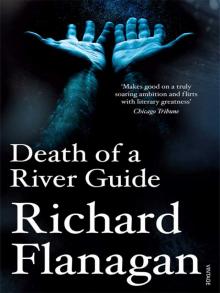 Death of a River Guide
Death of a River Guide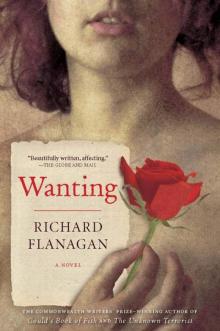 Wanting
Wanting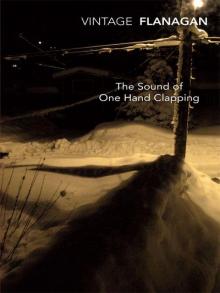 The Sound of One Hand Clapping
The Sound of One Hand Clapping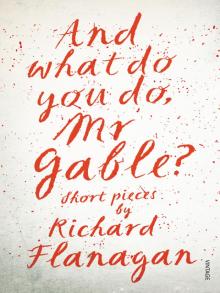 And What Do You Do Mr. Gable?
And What Do You Do Mr. Gable?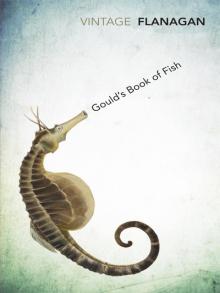 Gould's Book of Fish: A Novel in Twelve Fish
Gould's Book of Fish: A Novel in Twelve Fish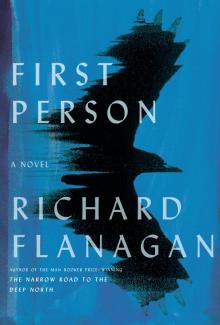 First Person
First Person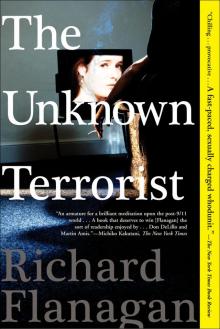 The Unknown Terrorist
The Unknown Terrorist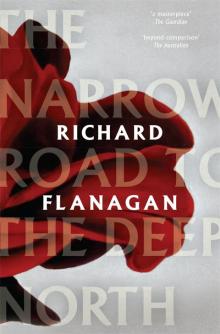 The Narrow Road to the Deep North
The Narrow Road to the Deep North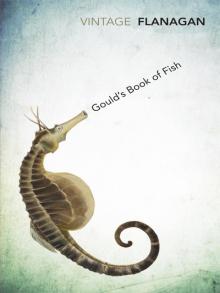 Gould's Book of Fish
Gould's Book of Fish